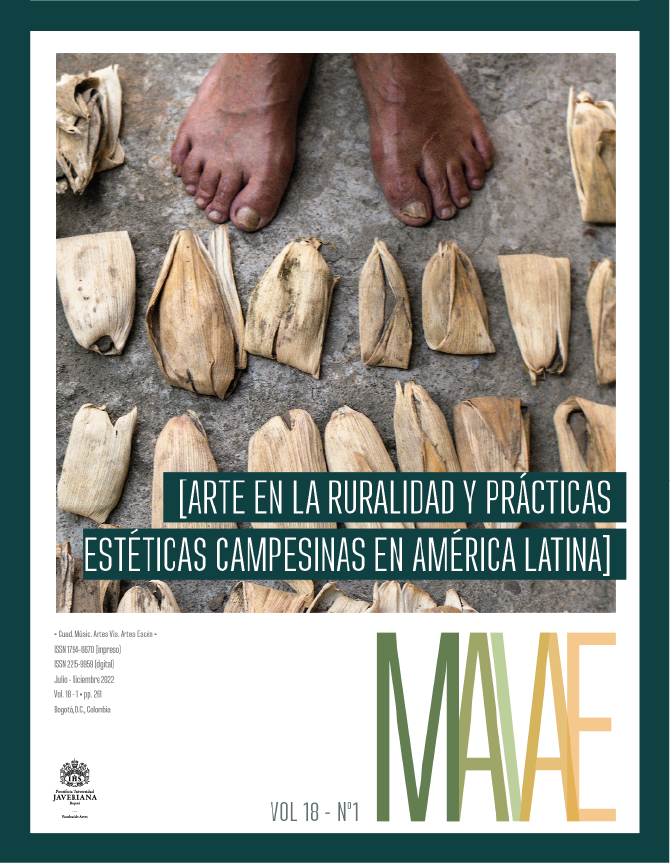Resumen
Este artículo explora la construcción del campesino en El cargador, de Víctor Zavala Cataño, la misma que forma parte de su libro Teatro campesino. A partir de la conocida idea de que el teatro campesino pone al campesino en el centro por primera vez en la historia de la dramaturgia peruana, analizaré cómo es construida esta representación. Para estos fines, el artículo explora análisis previos, entrevistas en profundidad realizadas a artistas escénicos y análisis de pieza. A partir de lo anterior, se propone que la representación del campesino en el contexto que nos ocupa persiste en construirlo como una víctima sin agencia, más específicamente, como aquel que desconoce su condición y no puede articular su malestar en una acción de cambio, lo que colabora con una matriz tutelar y paternalista que lo pone en la posición de un “otro”. Asimismo, el teatro campesino ignora las manifestaciones teatrales presentes en la fiesta andina y las representa como ajenas e inútiles para los campesinos y cargadores, a pesar de que estas pueden ser leídas como el espacio por excelencia de la teatralidad andina en el Perú. Asimismo, se explorará la relación entre campesino y universidad propuesta por El cargador en que la segunda es presentada como poseedora del saber político necesario para la acción política campesina. De forma exploratoria, empezamos a pensar el teatro campesino como un fenómeno urbano y universitario.
Arrunátegui Matos, Carolina Abigail. 2010. “El racismo en la prensa escrita peruana: Un estudio de la representación del Otro amazónico desde
el análisis crítico del discurso”. Discurso y Sociedad 4, n.º 3: 428-470.
Béjar, Héctor. 2015. Perú 1965: Apuntes sobre una experiencia guerrillera. Marxists Internet Archive. https://www.marxists.org/espanol/
tematica/guerrilla/peru/bejar/1965.htm
Boal, Augusto. 2013. Teatro del oprimido. Barcelona: Alba.
CVR (Comisión de la Verdad y Reconciliación). 2003. Informe final. Lima:CVR. https://www.cverdad.org.pe/ifinal/
Degregori, Carlos Iván. 2014. Qué difícil es ser Dios. Lima: Instituto de Estudios Peruanos.
Degregori, Carlos Iván. 2017. El surgimiento de Sendero Luminoso:
Ayacucho, 1969-1979. Lima: Instituto de Estudios Peruanos.
Freitas, Patricia. 2017. “Ás vistas com Víctor Zavala Cataño e seu teatro campesino”. http://augustoboal.com.br/2017/09/08/
as-vistas-com-victor-zavala-catano-e-seu-teatro-campesino-texto-depatricia-
freitas/
Gallardo-Saborido, Emilio J. 2017. “Torcer el remolino de injusticia: Teatro, campesinado peruano y denuncia social en Víctor Zavala”. Estudos Ibero-Americanos 43, n.º 1: 97-111. https://idus.us.es/bitstream/handle/11441/56524/Torcer_el_remolino_de_injusticia_teatro_campesinado_peruano_y_denuncia_social_en_Victor.
pdf?sequence=1&isAllowed=yMediavilla Martínez, Paz. 2016. “El teatro peruano contemporáneo (1960-2000): Aproximación”. Tesis de doctorado. Universidad Complutense de Madrid. https://eprints.ucm.es/id/eprint/40114/1/T38017.pdf
Mitrovic, Mijail. 2020. “Sendero y la cancelación del pasado reciente”.Quehacer, n.º 5. http://revistaquehacer.pe/n5#sendero-y-lacancelacion-
del-pasado-reciente
Motos, Tomás. 2009. “Augusto Boal: Integrador del teatro, del activismo social y político, de la educación y de la terapia”. Ñaque, n.º 59.
https://www.naque.es/index.php/revista?id=76
Portocarrero, Gonzalo. 2012. Profetas del odio: Raíces culturales y líderes de Sendero Luminoso. Lima: Pontificia Universidad Católica del Perú.
Robles-Moreno, Leticia. 2018. “Diálogos del cuerpo y fuerza política: El conflicto armado interno (1980-2000)”. En Contrapunto ideológico y perspectivas dramatúrgicas en el Perú contemporáneo. Lima: Pontificia Universidad Católica del Perú.
Rubio, Miguel. 2009. “En busca de la teatralidad andina”. En Fiestas y rituales: Memorias X Encuentro Noviembre de 2009 Lima, Perú,
editado por John Galán Casanova, 245-262. Lima: Corporación para la Promoción y Difusión de la Cultura. https://www.infoartes.pe/wpcontent/
uploads/2014/12/fiestas-y-rituales.pdf#page=240
Schechner, Richard. 2012. Estudios de la representación: Una introducción.México: Fondo de Cultura Económica.
Valenzuela Marroquín, Manuel. 2011. “Subalternidad y violencia política en el teatro peruano: El ingreso del campesino como referente de
cambio en los discursos teatrales”. Alteridades 21, n.º 41: 161-174. https://www.scielo.org.mx/pdf/alte/v21n41/v21n41a15.pdf
Vich, Víctor. 2015. “Flor de retama: Avatares de una canción de protesta”. En Poéticas del duelo: Ensayos sobre arte, memoria y violencia política en el Perú, 21-31. Lima: Instituto de Estudios Peruanos.
Zavala Cataño, Víctor. 1983. Teatro campesino. Lima: Escena Contemporánea.
Esta revista científica se encuentra registrada bajo la licencia Creative Commons Reconocimiento 4.0 Internacional. Por lo tanto, esta obra se puede reproducir, distribuir y comunicar públicamente en formato digital, siempre que se reconozca el nombre de los autores y a la Pontificia Universidad Javeriana. Se permite citar, adaptar, transformar, autoarchivar, republicar y crear a partir del material, para cualquier finalidad, siempre que se reconozca adecuadamente la autoría, se proporcione un enlace a la obra original y se indique si se han realizado cambios. La Pontificia Universidad Javeriana no retiene los derechos sobre las obras publicadas y los contenidos son responsabilidad exclusiva de los autores, quienes conservan sus derechos morales, intelectuales, de privacidad y publicidad.
El aval sobre la intervención de la obra (revisión, corrección de estilo, traducción, diagramación) y su posterior divulgación se otorga mediante una licencia de uso y no a través de una cesión de derechos, lo que representa que la revista y la Pontificia Universidad Javeriana se eximen de cualquier responsabilidad que se pueda derivar de una mala práctica ética por parte de los autores. Como consecuencia de la protección brindada por la licencia de uso, la revista puede publicar retractaciones o corregir la información ya publicada. La publicación de contenidos en esta revista no representa regalías para los contribuyentes.


